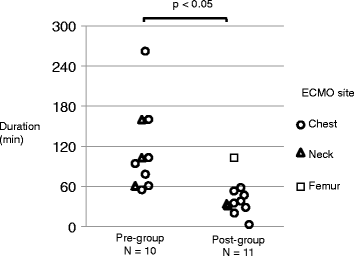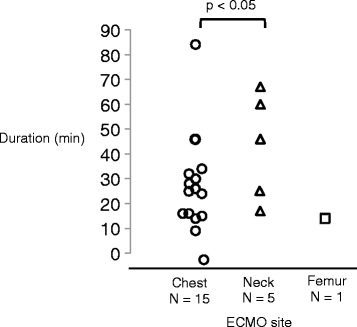Current experience and limitations of extracorporeal cardiopulmonary resuscitation for cardiac arrest in children: a single-center retrospective study
- PMID: 25705425
- PMCID: PMC4336122
- DOI: 10.1186/s40560-014-0068-x
Current experience and limitations of extracorporeal cardiopulmonary resuscitation for cardiac arrest in children: a single-center retrospective study
Abstract
Background: There are few reports detailing the importance of extracorporeal membrane oxygenation (ECMO) for pediatric cardiac arrest in Japan. We investigated the status and issues surrounding extracorporeal cardiopulmonary resuscitation (ECPR) at our institution.
Methods: Patients aged <15 years who underwent ECPR between April 1, 2003 and March 31, 2012 were eligible. The characteristics, cannulation site, durations of cardiopulmonary resuscitation (CPR), cannulation procedure, and ECMO, and neurologic outcomes were retrospectively reviewed. A favorable neurologic outcome was defined as Pediatric Cerebral Performance Categories 1 and 2.
Results: A total of 21 ECPR events were identified. The median CPR and cannulation durations were 60 and 25 min, respectively. Central and peripheral access sites were employed in 15 and six cases, respectively. Five of the 21 patients (24%) were successfully weaned from ECMO and three of the 21 (14%) survived. Two of the three survivors had a favorable neurologic outcome.
Conclusions: The mortality of patients undergoing ECPR at our institution was low. However, about 10% of all patients had a favorable neurologic outcome, which suggests that ECPR may be effective in pediatric cardiac arrest patients.
Keywords: Cardiac arrest; Extracorporeal cardiopulmonary resuscitation; Extracorporeal membrane oxygenation; Pediatric intensive care.
Figures


References
-
- Chen YS, Lin JW, Yu HY, Ko WJ, Jerng JS, Chang WT, Chen WJ, Huang SC, Chi NH, Wang CH, Chen LC, Tsai PR, Wang SS, Hwang JJ, Lin FY. Cardiopulmonary resuscitation with assisted extracorporeal life-support versus conventional cardiopulmonary resuscitation in adults with in-hospital cardiac arrest: an observational study and propensity analysis. Lancet. 2008;372:554–561. doi: 10.1016/S0140-6736(08)60958-7. - DOI - PubMed
-
- Kane DA, Thiagarajan RR, Wypij D, Scheurer MA, Fynn-Thompson F, Emani S, del Nido PJ, Betit P, Laussen PC. Rapid-response extracorporeal membrane oxygenation to support cardiopulmonary resuscitation in children with cardiac disease. Circulation. 2010;122:S241–S248. doi: 10.1161/CIRCULATIONAHA.109.928390. - DOI - PubMed
-
- Alsoufi B, Al-Radi OO, Nazer RI, Gruenwald C, Foreman C, Williams WG, Coles JG, Caldarone CA, Bohn DG, Van Arsdell GS. Survival outcomes after rescue ECPR in pediatric patients with refractory cardiac arrest. J Thorac Cardiovasc Surg. 2007;134:952–959. doi: 10.1016/j.jtcvs.2007.05.054. - DOI - PubMed
LinkOut - more resources
Full Text Sources
Other Literature Sources
Miscellaneous

